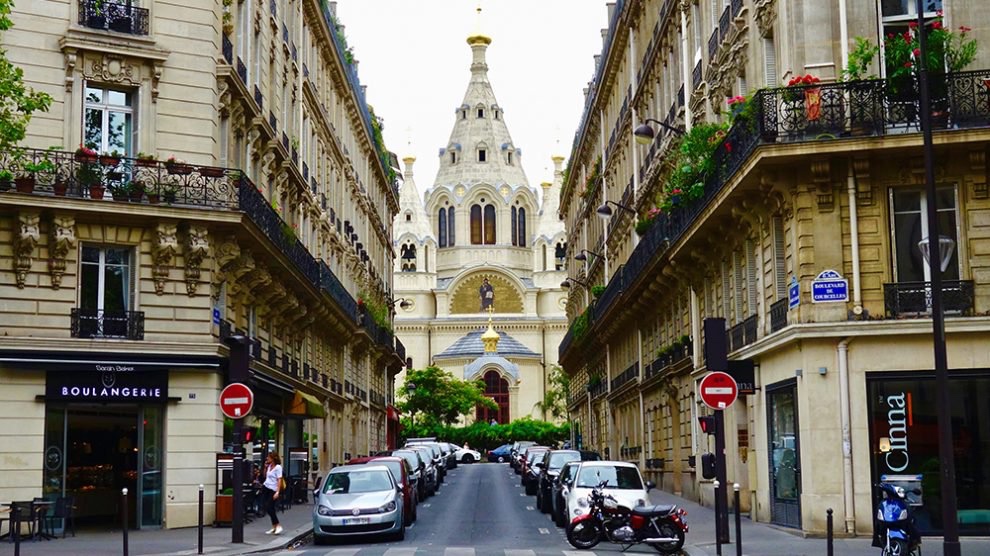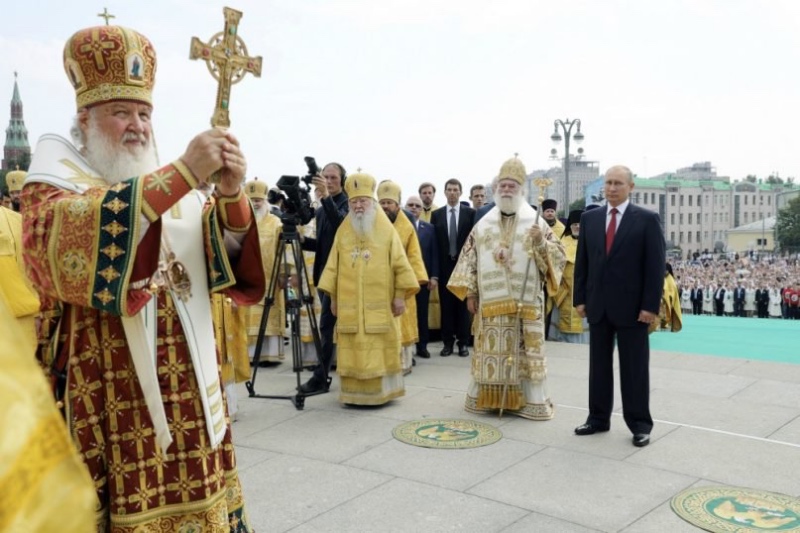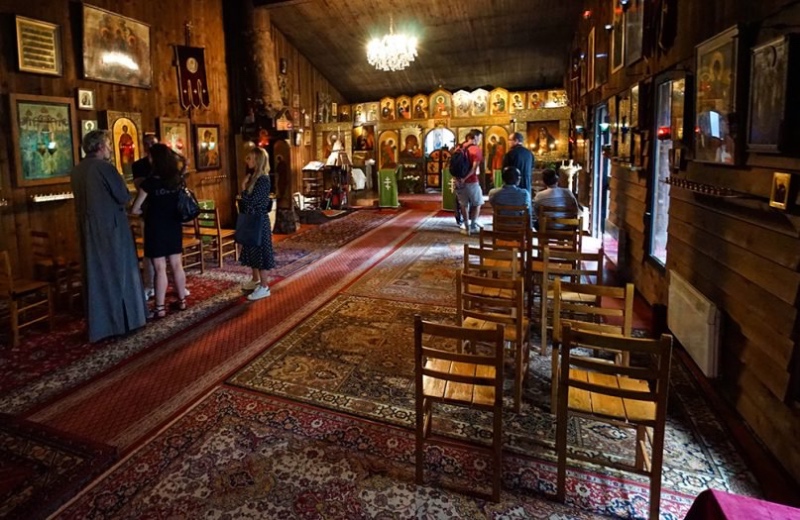
TOM HENEGAN, of Religion News Service, reports on the decision facing Russian churches in Western Europe…
Paris
RNS
The archdiocese of émigré Russian churches in Western Europe, founded in Paris by refugees from the 1917 Bolshevik Revolution, is split between rejoining the post-communist Moscow Patriarchate or being merged into Orthodox Christianity’s globalised diaspora.
As of Tuesday, the archdiocesan leadership was inching toward taking the historic step to restore ties to Moscow, more than a century after the leaders’ forebears fled a homeland that had become officially atheist.

The Alexander Nevsky Cathedral of the Archdiocese of Russian Orthodox Churches in Western Europe in the rue Daru in the 8th arrondissement of Paris. PICTURE: Tom Heneghan/RNS
The decision was almost made over this past weekend, but like most things connected with émigré politics and disputes among Eastern Orthodox churches, it got complicated.
The archdiocese, based mostly in France but stretching to Norway in the north and Italy in the south, met in a special general assembly in Paris on Saturday and Sunday that voted by 58.1 per cent to 41.9 per cent to switch its allegiance from the Ecumenical Patriarchate in Istanbul back to the Moscow Patriarchate.
The return of the émigré archdiocese would be a victory for the Moscow Patriarchate, which has been using its size and political influence to challenge the Ecumenical Patriarchate, the official “first among equals” among the 14 national or regional Orthodox churches.
But as the body’s statutes say the archdiocese needs a two-thirds majority to take such a step, the decision is on hold until a supermajority can be stitched together, or until the archdiocese’s individual parishes supersede the assembly’s vote.
Archbishop Jean of Charioupolis, the 76-year-old Frenchman who has led the Archdiocese of Russian Orthodox Churches in Western Europe since 2016, seemed to have another path in mind.
“This two-thirds majority is an old protection dating back to the Soviet era,” he said. “We now have to see with our lawyers how to get support for that,” he said after Saturday’s vote.
The return of the émigré archdiocese would be a victory for the Moscow Patriarchate, which has been using its size and political influence to challenge the Ecumenical Patriarchate, the official “first among equals” among the 14 national or regional Orthodox churches.
The Eastern Orthodox churches, which split with the Roman Catholic Church in 1054, claim 250 million to 300 million believers, mostly in Eastern Europe and the Middle East. The Moscow Patriarchate is by far the largest, with over half the world’s Orthodox, while the Ecumenical Patriarchate in former Constantinople is among the smallest.
Over the past two centuries, emigration and globalization have scattered Orthodox believers around the globe, especially to Western Europe and North America. This has led to a confusing network of authority and loyalty that Moscow and Istanbul – each in its own way – are trying to iron out.
Russian President Vladimir Putin and the oligarchs around him have actively supported Russian Patriarch Kirill over the past decade, lavishing state favors, as well as public and private funds, on his church to expand its reach – and indirectly the Kremlin’s influence – among Orthodox faithful both at home and abroad.
The Ecumenical Patriarch, Orthodoxy’s spiritual leader, has no right to intervene in other member churches’ affairs. But it too has been trying to exert influence by promoting more cooperation among its churches and disentangling some structures that have grown up over time.

Russian Orthodox Church Patriarch Kirill, left, leads a service as Russian President Vladimir Putin, right, and Eastern Orthodox Patriarch of Alexandria and all Africa Theodoros II, second right, attend in Moscow on 28th July, 2018. PICTURE: Mikhail Klimentyev, Sputnik, Kremlin Pool Photo via AP.
One of these odd structures is the émigré Russian archdiocese, which became an exarchate (special diocese) of the Ecumenical Patriarchate in 1931. That shielded it from the Moscow Patriarchate, which had come under Soviet control.
“As a multi-ethnic, multilingual ecclesial body…the archdiocese is an icon of universal Orthodoxy,” Paul Ladouceur, an Orthodox theologian in Canada, recently wrote.
“It is the Orthodox jurisdiction which comes closest to implementing the church governance system approved by the Russian Orthodox Church council in 1917-1918.”
That council called for less clerical dominance in the tradition-bound church and supported contacts with other faiths. Its leader, Patriarch Tikhon, had seen ecumenism firsthand during almost a decade as Russian Orthodox archbishop of North America.
The two rival patriarchates clashed openly last October when Istanbul decided to recognise a new Kiev Patriarchate in Ukraine, which belonged to Russia for centuries but became an independent country when the Soviet Union collapsed in 1991.
Inspired by that council, the Paris émigrés founded the St Sergius Orthodox Theological Institute, which in its heyday was one of the most dynamic centres in the Orthodox world. It has since come on hard times financially.
The two rival patriarchates clashed openly last October when Istanbul decided to recognise a new Kiev Patriarchate in Ukraine, which belonged to Russia for centuries but became an independent country when the Soviet Union collapsed in 1991.
This was an open affront to Moscow, which stands to lose a large minority of its overall flock if churchgoers in Ukraine switch to the new national church there. The Russian church promptly cut off communion with Istanbul and its followers in retaliation.
In November, the Ecumenical Patriarchate unexpectedly declared the émigré church was no longer an exarchate and its parishes should join the Orthodox churches in their respective countries.
In France, for example, that would mean their new archbishop would be the Greek Orthodox Metropolitan Emmanuel, who already has other ethnic parishes under his authority and lets them keep their own languages and customs.
The émigré archdiocese has long gone beyond its ethnic roots and Paris origin. It now covers Belgium, Britain, Denmark, France, Germany, Italy, Netherlands, Norway, Spain and Sweden, comprising 118 parishes, with 123 priests and 40 deacons. Its services follow Russian tradition but in several local languages.

Inside the Church of St Seraphin of Sarov in the 15th arrondissement of Paris, one of the émigré archdiocese’s parish churches in France. PICTURE: Tom Heneghan/RNS
Other Orthodox churches in the West have also slowly turned multi-ethnic. One Greek Orthodox church in southern France, for example, prays in the French tongue that all parishioners understand but recites the Lord’s Prayer in six languages – Arabic, French, Georgian, Greek, Romanian and Slavonic – in deference to the congregation’s many ethnic roots.
On Saturday, immediately after the émigré archdiocese’s vote was known, a senior priest of the patriarchate in Moscow said any Western parishes that wanted to join the Russian Orthodox Church could do so on an individual basis.
“Those who turn to the Russian Church to receive them will be accepted,” Archpriest Nicolai Balashov, deputy head of the patriarchate’s Department for External Relations, told Interfax news agency. “A significant part of the clerics and laity would like to join the Russian Church.”
Not all may want to switch to the Moscow Patriarchate, which is more traditional and clericalist than the Western archdiocese and known for close ties with the Kremlin, a French Orthodox priest noted.
“A lot of the Russian priests have called Metropolitan Emmanuel asking about being incardinated [in his archdiocese],” the priest, who asked not to be named, told Religion News Service.
But most signs point toward an eventual switch to the Moscow Patriarchate, even if a minority of parishes decides not to follow.
The Paris-based archdiocese voted overwhelmingly last February to stay together under its archbishop, an option that Moscow has accepted.
Its St Alexander Nevsky Cathedral in Paris, built in 1861 with financial help from Tsar Alexander II, would be degraded to a simple church if it stayed with Istanbul, Archbishop Jean told a prayer service held there two days before the vote.
The archdiocese stood before a choice between life or death, he said: “We want this archdiocese to continue to live with its traditions, its particularities and its autonomy.”





